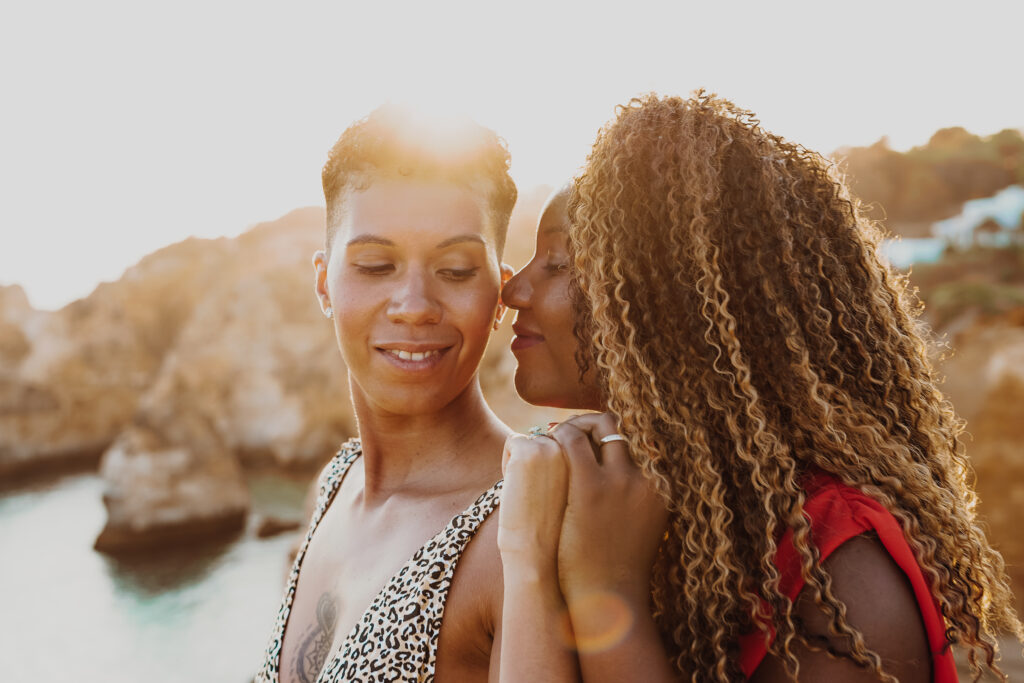Meet Lexie and Aisha Shaibu-Lenoir, The Queer Nomads
If you’re in the travel industry or following queer travelers on social media, then you may have run across Lexie and Aisha Shaibu-Lenoir also known as The Queer Nomads. Together for more than six years, the queer lesbian couple, based in London, charted their own course during the pandemic to create a personal brand with one primary focus.
“We’re not going to take amazing photos with our super nice camera or anything, but it’s the visibility element that was important for us to start with; then obviously, we got better at marketing ourselves,” said Lexie. “But we started it essentially to be more visible in this massive pool of non-visibility.”
The couple wanted to see more Black and queer representation, so they essentially became the change they wanted to see. To better understand their passion for travel, you should become more familiar with their background. Born in London, Aisha spent her childhood in Nigeria, where she believed she cultivated a curiosity to explore the world and adopted the tools to lean into her wanderlust. Eventually, she returned to London for university (higher education), and at 18, traveled solo around Italy, Brazil, and Asia. It was a journey of self-discovery, ultimately allowing her to become a better person.
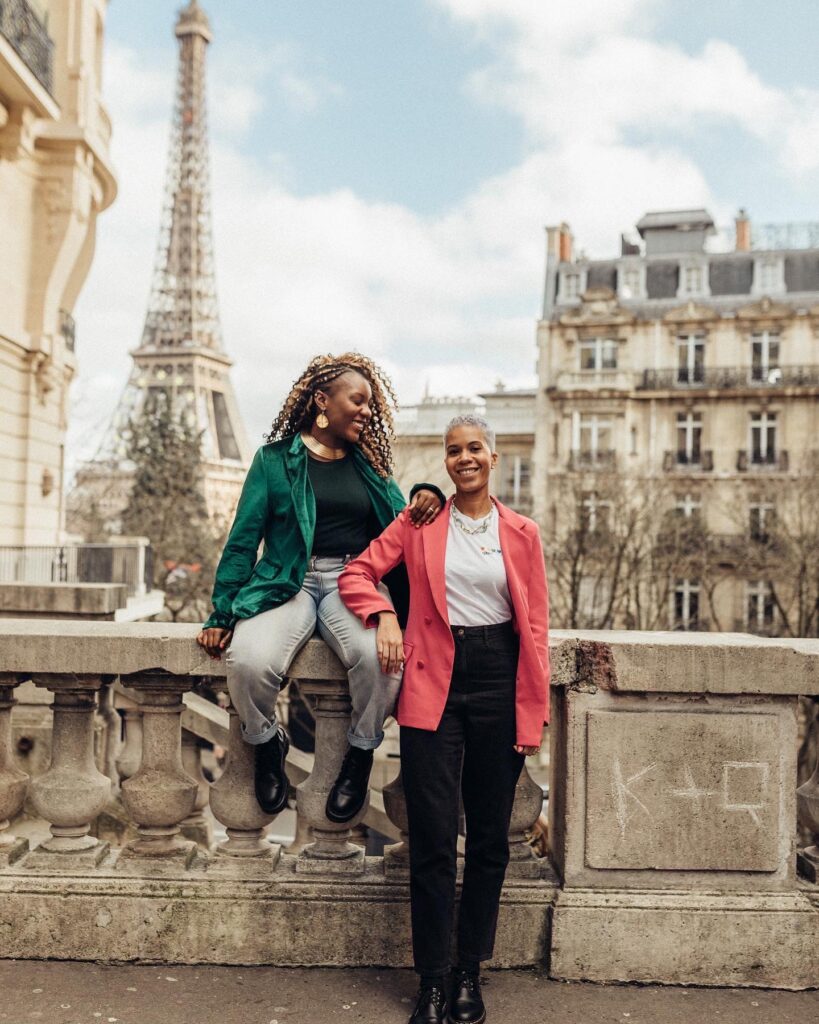
“I felt it [travel] was an escape to discover my queerness. To be away from home, especially when you don’t feel comfortable and you’re like, ‘I know I’m queer and I know I’m different.’ I didn’t have the freedom. Travel gave me the freedom,” said Aisha.
Lexie also thinks moving to London alone was the catalyst that fueled her passion for travel. She was born in Paris, but her family is from Guadeloupe, a French Caribbean Island she remembers visiting a couple of times when she was younger. But moving from Paris to London was a pivotal moment for her.
“I realized that it’s not that hard to travel. That sparked my interest in travel, and then I started solo traveling to different countries in Europe and also abroad to Asia and America.”
Travel Beyond the LGBTQ+-Friendly Destinations
Lexie and Aisha’s travel planning – solo or as a couple – requires research to become familiar with a destination’s LGBTQ+ laws, but that doesn’t always dictate where they go. For them, it’s all about connecting with the LGBTQ+ community that exists either in plain sight or hidden from the larger population.
Lexie recalls a trip to the Middle East. “You have to think that in countries like Dubai where it’s not okay to be gay. It’s legally punishable. You’re going to find your people there who are not able to be queer, free and open, and they all have to hide themselves,” she explained. It’s one of the reasons Lexie is grateful to live in a country that provides legal protections for people who identify as LGBTQ+. Understanding that and the fact that she has privilege when she travels; gives her more reasons to connect with local communities wherever she goes.
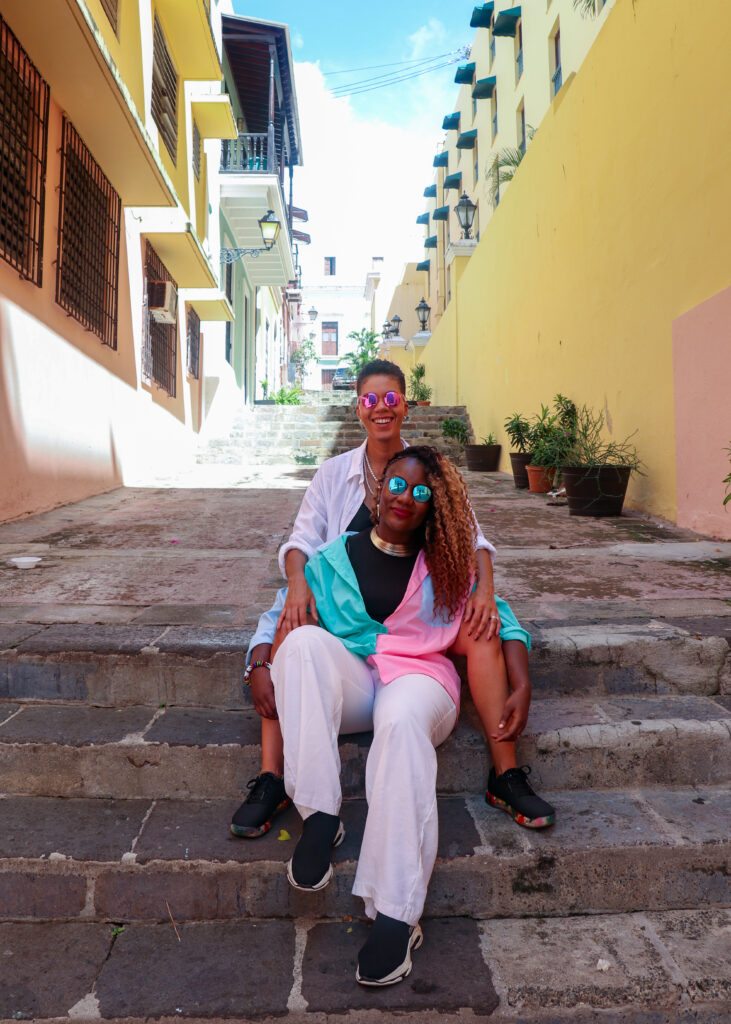
Aisha agrees with Lexie that queer travelers, if they feel comfortable doing so, should travel beyond the usual LGBTQ+-friendly destinations, adding Africa as a potential option.
“In African countries, there’s always a notion that places where homosexuality is illegal means that there are no queer people that exist, but that’s not the case. Historically in all of these countries where it’s illegal to be queer; queer people have always existed,” Aisha noted.
With family from both Nigeria and Ghana, Aisha always felt there was a stigma in Africa where she said, “You’re not allowed to be gay. It’s a white thing.” She continued, “In Africa, there’s this kind of preconception of what a gay person is meant to be like.” It’s that closed-mindedness that made her feel more invisible, and those perceptions about queer folx that she wanted to change with Lexie. The Queer Nomads wanted to inspire their friends, not usually represented in travel marketing campaigns, to embrace the power of travel as a tool for personal growth and to discover themselves.
The Genesis of The Queen Nomads Brand
Lexie and Aisha see the role of a travel influencer as limiting, so they’ve adopted the title of travel activists, who fight for brands and the travel industry to broaden their scope to include the narratives of underrepresented and marginalized groups.
During the pandemic, the couple not only launched The Queer Nomads brand, but the ladies became entrepreneurs! Drawing on 15 years of expertise in luxury hospitality and coordinating weddings and events, Lexie launched Queer Weddings, a small queer-owned wedding planning company in East London, and Aisha started Moonlight Experiences, an organization designed to celebrate diverse queer culture through tourism and nightlife events in cities throughout Europe, Africa, and the US.
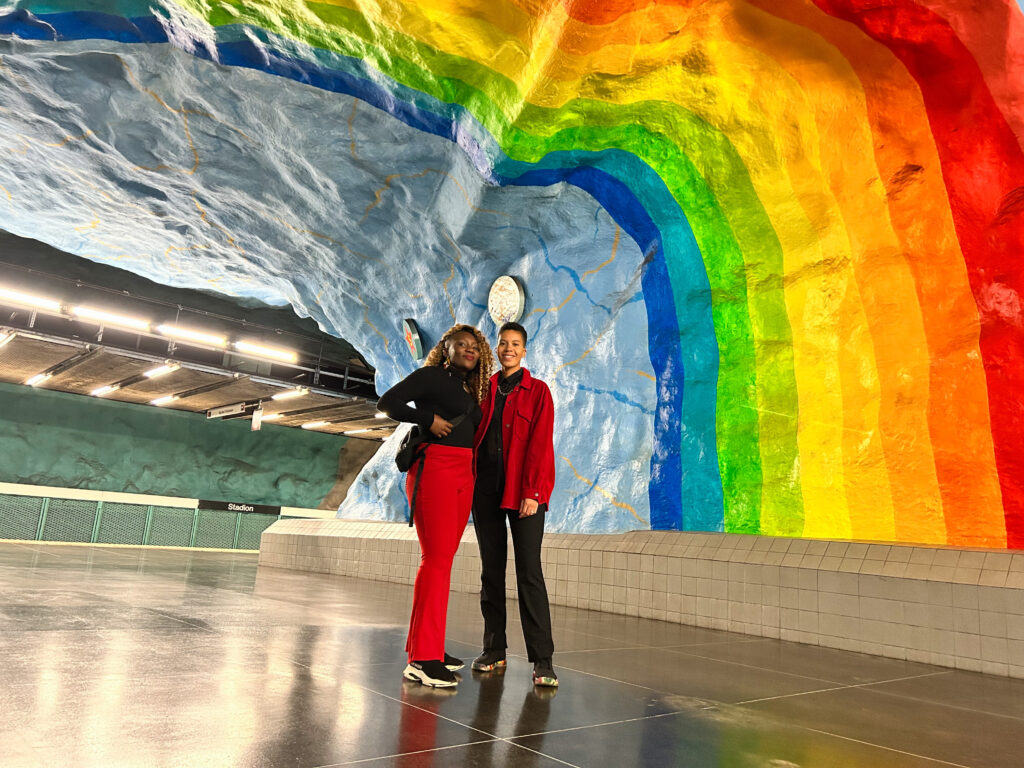
Creating these unique services for the queer community, Lexie and Aisha understood the importance of giving back and providing a platform to help future generations. “A lot of people fought for us to be here today. They pushed and worked hard, and I think we’re part of that same ripple effect and doing our part, whatever that may be. We’re part of a larger group that is creating those spaces, those resources, those stories that transform people’s lives. When were younger, we never had those things,” explained Aisha.
Aisha and Lexie are trailblazers in their own right and also understand the power of their Black queer dollar (or pound in their case). “We both run our own businesses. In many different ways, we are in positions of privilege. We work, we get money, and with this money, we earn doing hard work, we earn hard cash. I want to spend it in places that align with my values, not spend my money on a business that’s completely performative,” said Lexie. So, they focus on spending their money on queer organizations like UK Black Pride as well as Black-owned and LGBTQ+-owned businesses that also support them as a couple.
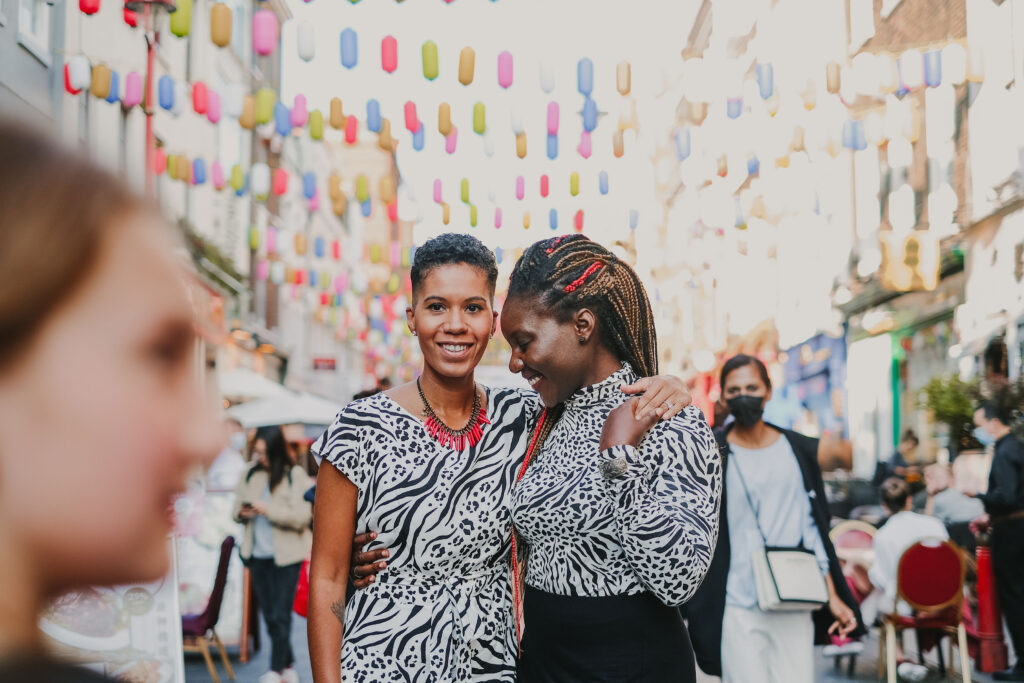
According to the Black Travel Alliance, Black leisure travelers spent $129.6 billion in the U.S. and $9 billion in the UK and Ireland; whereas LGBTQ+ travelers spent an estimated $218 billion worldwide before the pandemic, according to Skift.
Those mind-blowing numbers still haven’t compelled the travel industry and or travel-related businesses to pivot and develop more diverse campaigns to recognize the power of the Pink and Black dollar. After the death of George Floyd, there was a reckoning and brands started to support Black Lives Matter and be more present to make sure Black voices were heard, including in popular mainstream travel publications.
Making Intentional Changes for Diversity in the Travel Industry
But where do we stand now? We asked The Queer Nomads to rate the travel industry’s job when it comes to embracing the diversity of all people. They gave the travel industry a 3 out of 10.
“A lot of brands felt like they had to change, and they needed to change. Now, my concern is not that people are unaware that there’s a lack of inclusion or diversity in the industry; it’s whether they’re going to make changes over a long period of time. Are they doing the work to make sure that this is something that will have a lasting impact?”
Lexie believes things started to change, but over the past few years, the needle for progress in the travel industry and travel-related brands has barely moved. “You were happy to put a black square on your Instagram feed to show your support, which is fantastic, but what are we concretely doing to change narratives everywhere?” She believes that when brands hire diverse white people – such as a cisgender white man – as the head of diversity. She doesn’t believe that is really an authentic commitment to full diversity. In fact, the diversity of some brand’s LGBTQ+ or Black advisory boards should also be reflected in the executive teams and staff of these companies.
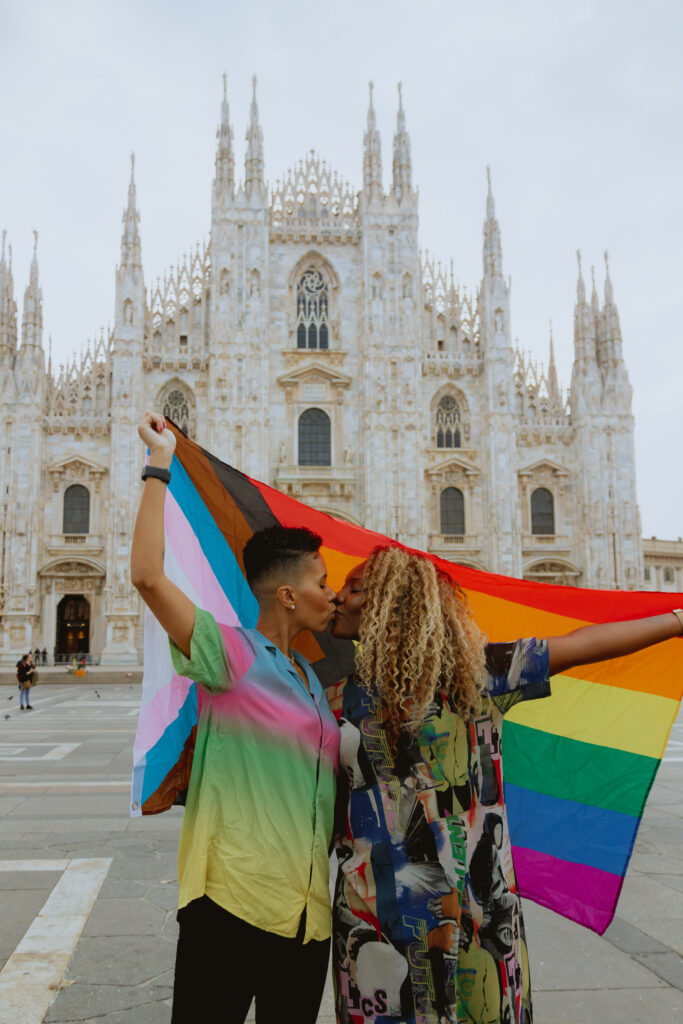
The couple admits they don’t want to force travel brands to change. Instead of relying on others to change, they insist that the community should create these spaces and or opportunities. Aisha offers an example of an LGBTQ+ history tour that erases the Black narrative or doesn’t feel the need to include us. She noted, “I’m tired of us waiting or asking or pushing. We need to come together to start building these things. So, I think that Black people, especially, need to start building those bridges because we have been very late to the mark to collaborate and have a bigger impact.”
Lexie and Aisha do think that there needs to be more collaborative efforts between Black and queer thought leaders in the travel industry. All that being said, they do believe the travel industry is slowly evolving, and that there are brands (post-pandemic) still doing the work to engage with underrepresented groups. And they’ve seen and worked with travel brands that have or are making intentional moves to be better.
Brands That Are Doing the Work
Speaking of intentional moves, the couple have collaborated with brands that they believe are doing the work to be inclusive and showcase diversity, such as Celebrity Cruises, Accor, and Contiki, a company that appointed Aisha as its LGBTQ+ Ambassador!
“The idea is when we are working with these brands to start creating changes within them that we also make sure they are working with Black-owned organizers and gay organizers, and making sure that they are providing inclusive services,” said Aisha.
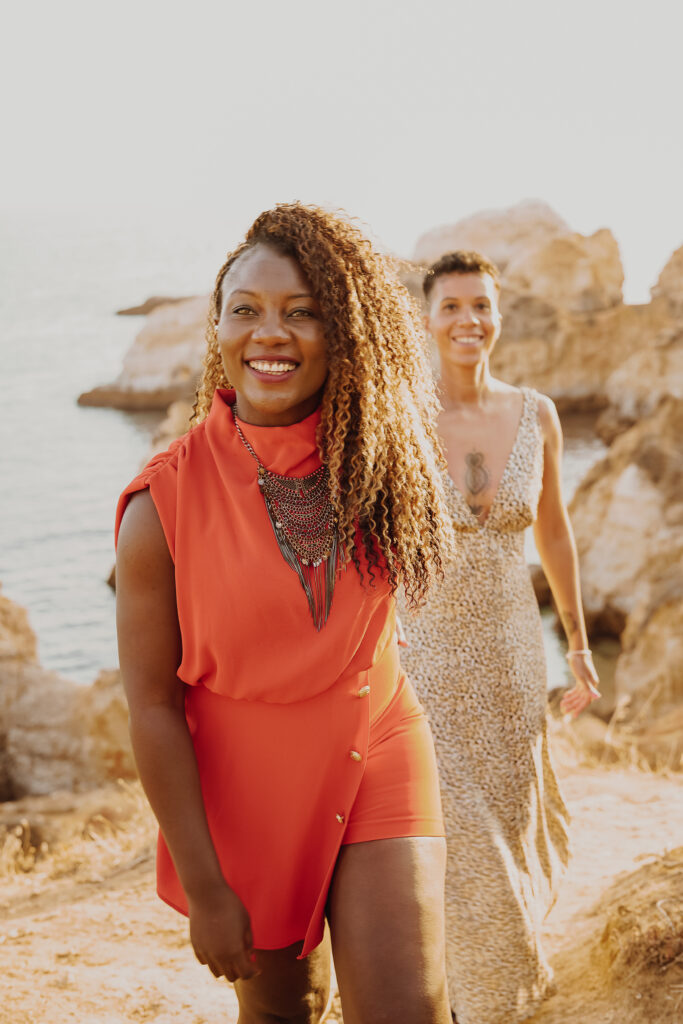
Lexie explains, “Accor gave us complete freedom to create a map [LGBTQ+ Guide to Paris]. They didn’t say, “Oh we want you to do this and have this on the map.” They were like, “You tell us the LGBTQ places you go because you’re the queer people at the end of the day.” They can’t speak for us. So they gave us the mic.”
It’s just one of many ways Black queer entrepreneurs Lexie and Aisha Shaibu-Lenoir are using their voices and visibility to change the travel industry and associated brands, and leading the charge to make it easier for Black queer travelers to navigate the world.
Find out more about The Queer Nomads and visit their website and follow them on Instagram and X (Twitter).
Vacationer will lighten things up with part two of our interview with Lexie and Aisha Shaibu-Lenoir in a couple of weeks. Stay tuned to find out who’s a big Nicki Minaj fan, what places are on their travel bucket list, and what they recommend for queer travelers visiting London for the first time!

